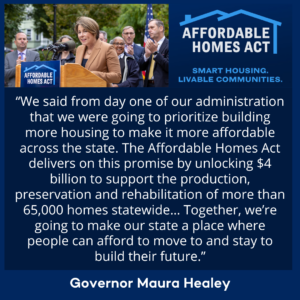Every state is impacted by the national housing shortage. Housing prices have soared. Inflation has driven interest rates higher, increasing monthly mortgage costs and almost doubling the household income needed to purchase the median home. With interest rates topping 8 percent, many homeowners are unwilling or unable to sell their existing home — reducing turnover. Additionally, developers that face increasing supply and labor costs have chosen to focus on higher end property construction. Between existing units staying off the market and a shortage of new starter and affordable units, times are tough for households looking to buy or rent.
In October, NGA hosted Governors’ staff in Nashville to discuss options to respond to these challenges. Policy Directors and Deputy Chiefs of Staff for Governors received a briefing on economic trends and heard presentations from multiple states regarding ongoing regulatory and legislative efforts to address housing problems.
While housing policy is primarily controlled at the local government level, Governors are innovating to increase housing supply while keeping it affordable.
Pennsylvania Governor Shapiro’s staff discussed ongoing efforts to improve supply through their whole home repair program that uses weatherization and other funds to ensure more affordable housing units remain available. They also discussed how they use Community and Economic Development funds to support development and require funding recipients to offer affordable rents for set periods. They related the importance of having someone with mayoral and local government experience involved in housing policy.
“So many Pennsylvanians are struggling to keep up with rising prices – we need to make sure people living paycheck to paycheck can afford to maintain their homes so that they’re safe and healthy for themselves and their families.”
Governor Josh Shapiro
Virginia Governor Youngkin’s staff shared information about his ongoing “Make Virginia Home” plan, which included a statewide survey of existing housing, affordable housing units, and expected growth. This plan included creation of an inventory of surplus state property that could be sold for development. The Governor directed expansion of Virginia’s Housing and Community Development Tax Credits through the legislature. They also discussed efforts to address litigation and proffer requirements by local governments that place additional conditions on developers for project approval, as well as support for local governments to ensure clear titles and funding to assist with stormwater management.
“After listening directly from Virginians on the various housing issues across our Commonwealth, my administration created the ‘Make Virginia Home’ plan. It is designed to address the restrictions on housing supply, improve and streamline permitting processes, and protect property owner rights. For far too long, Virginians have faced unnecessary burdens that have limited their housing options and opportunities.”
Governor Glenn Youngkin
Massachusetts Governor Healey’s staff described her newly announced “Affordable Homes Act.” The proposed package includes $4 billion in funding, with $1.6 billion going toward repair and modernization of existing public housing units across the state. It includes $200 million for a Housing Innovations fund to support rental housing for the homeless, seniors and veterans, and those recovering from substance abuse. $175M is included to support municipal infrastructure projects to encourage denser development.
The package further includes the creation of a Homeowner Production Tax Credit to incentivize developers to create housing for individuals earning the area median income and the extension and expansion of the existing community investment tax credit. It allows local governments to access a real estate transaction fee on property sales of over $1 million with those proceeds to go to affordable housing development. Additionally, it allows for accessory dwelling units (ADU) less than 900 square feet to be built on single family zoned properties as a matter of right. Furthermore, Governor Healey signed three executive orders creating a Housing Advisory Council and a Housing Production Commission, and directing state agencies to inventory state-owned land suitable for housing. She proposed sealing and expunging eviction records after certain requirements were met.
These presentations were followed by robust discussions around financial incentives for first-time homebuyers, those who have recently lost their jobs, as well as existing property owners and developers. Discussions included ways to encourage and support local governments to adopt policies and ways to assist with the costs of water, sewer, and transportation infrastructure. Multiple states and territories brought up conflicts regarding federal land ownership as well as access to water, construction workforce issues and dealing with the federal government for loan approvals. Other states offered ideas on how to work with transit agencies and others to encourage denser development. There were also requests for how to encourage infill development and discussion of challenges with private equity. The session concluded with a desire for more information and future communication on outcomes supported by metrics.
For further information, to share initiatives or join in future conversations on this topic, please contact Will Carraco in the NGA Center for Best Practices.













